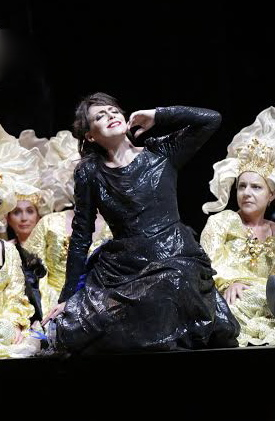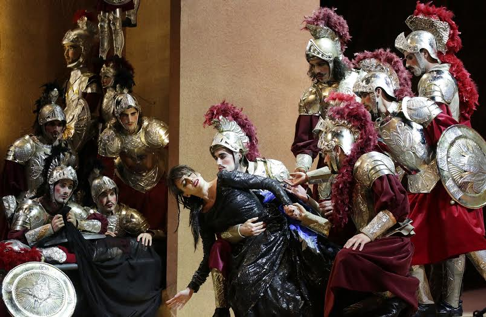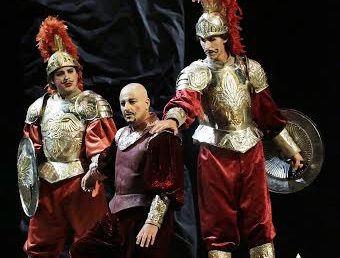
20 Aug 2014
Armida in Pesaro
Armida (1817) is the third of Rossini’s nine operas for the Teatro San Carlo in Naples, all serious. The first was Elisabetta, regina di Inghilterra (1815), the second was Otello (1816), the last was Zelmira (1822).
English Touring Opera are delighted to announce a season of lyric monodramas to tour nationally from October to December. The season features music for solo singer and piano by Argento, Britten, Tippett and Shostakovich with a bold and inventive approach to making opera during social distancing.
This tenth of ten Live from London concerts was in fact a recorded live performance from California. It was no less enjoyable for that, and it was also uplifting to learn that this wasn’t in fact the ‘last’ LfL event that we will be able to enjoy, courtesy of VOCES8 and their fellow vocal ensembles (more below …).
Ever since Wigmore Hall announced their superb series of autumn concerts, all streamed live and available free of charge, I’d been looking forward to this song recital by Ian Bostridge and Imogen Cooper.
The Sixteen continues its exploration of Henry Purcell’s Welcome Songs for Charles II. As with Robert King’s pioneering Purcell series begun over thirty years ago for Hyperion, Harry Christophers is recording two Welcome Songs per disc.
Although Stile Antico’s programme article for their Live from London recital introduced their selection from the many treasures of the English Renaissance in the context of the theological debates and upheavals of the Tudor and Elizabethan years, their performance was more evocative of private chamber music than of public liturgy.
In February this year, Albanian soprano Ermonela Jaho made a highly lauded debut recital at Wigmore Hall - a concert which both celebrated Opera Rara’s 50th anniversary and honoured the career of the Italian soprano Rosina Storchio (1872-1945), the star of verismo who created the title roles in Leoncavallo’s La bohème and Zazà, Mascagni’s Lodoletta and Puccini’s Madama Butterfly.
Evidently, face masks don’t stifle appreciative “Bravo!”s. And, reducing audience numbers doesn’t lower the volume of such acclamations. For, the audience at Wigmore Hall gave soprano Elizabeth Llewellyn and pianist Simon Lepper a greatly deserved warm reception and hearty response following this lunchtime recital of late-Romantic song.
Collapsology. Or, perhaps we should use the French word ‘Collapsologie’ because this is a transdisciplinary idea pretty much advocated by a series of French theorists - and apparently, mostly French theorists. It in essence focuses on the imminent collapse of modern society and all its layers - a series of escalating crises on a global scale: environmental, economic, geopolitical, governmental; the list is extensive.
For this week’s Live from London vocal recital we moved from the home of VOCES8, St Anne and St Agnes in the City of London, to Kings Place, where The Sixteen - who have been associate artists at the venue for some time - presented a programme of music and words bound together by the theme of ‘reflection’.
'Such is your divine Disposation that both you excellently understand, and royally entertaine the Exercise of Musicke.’
Amongst an avalanche of new Mahler recordings appearing at the moment (Das Lied von der Erde seems to be the most favoured, with three) this 1991 Mahler Second from the 2nd Kassel MahlerFest is one of the more interesting releases.
‘And there was war in heaven: Michael and his angels fought against the dragon; and the dragon fought and his angels, And prevailed not; neither was their place found any more in heaven … that old serpent … Satan, which deceiveth the whole world: he was cast out into the earth, and his angels were cast out with him.’
If there is one myth, it seems believed by some people today, that probably needs shattering it is that post-war recordings or performances of Wagner operas were always of exceptional quality. This 1949 Hamburg Tristan und Isolde is one of those recordings - though quite who is to blame for its many problems takes quite some unearthing.
There was never any doubt that the fifth of the twelve Met Stars Live in Concert broadcasts was going to be a palpably intense and vivid event, as well as a musically stunning and theatrically enervating experience.
‘Love’ was the theme for this Live from London performance by Apollo5. Given the complexity and diversity of that human emotion, and Apollo5’s reputation for versatility and diverse repertoire, ranging from Renaissance choral music to jazz, from contemporary classical works to popular song, it was no surprise that their programme spanned 500 years and several musical styles.
The Academy of St Martin in the Fields have titled their autumn series of eight concerts - which are taking place at 5pm and 7.30pm on two Saturdays each month at their home venue in Trafalgar Square, and being filmed for streaming the following Thursday - ‘re:connect’.
The London Symphony Orchestra opened their Autumn 2020 season with a homage to Oliver Knussen, who died at the age of 66 in July 2018. The programme traced a national musical lineage through the twentieth century, from Britten to Knussen, on to Mark-Anthony Turnage, and entwining the LSO and Rattle too.
With the Live from London digital vocal festival entering the second half of the series, the festival’s host, VOCES8, returned to their home at St Annes and St Agnes in the City of London to present a sequence of ‘Choral Dances’ - vocal music inspired by dance, embracing diverse genres from the Renaissance madrigal to swing jazz.
Just a few unison string wriggles from the opening of Mozart’s overture to Le nozze di Figaro are enough to make any opera-lover perch on the edge of their seat, in excited anticipation of the drama in music to come, so there could be no other curtain-raiser for this Gala Concert at the Royal Opera House, the latest instalment from ‘their House’ to ‘our houses’.
"Before the ending of the day, creator of all things, we pray that, with your accustomed mercy, you may watch over us."

Armida (1817) is the third of Rossini’s nine operas for the Teatro San Carlo in Naples, all serious. The first was Elisabetta, regina di Inghilterra (1815), the second was Otello (1816), the last was Zelmira (1822).
The San Carlo was the world’s most important theater at that time. Its legendary caffe waiter turned opera impresario Domenico Barbaja had not only the famous mezzo-soprano Isabella Colbran (his mistress, later Rossini’s wife) on his roster but also three splendid baritenori [literally baritone tenors] — the baritenore, the contraltino and the tenore di grazia represent the Italian high tenor voices of the time. Plus the San Carlo possessed a sizable stable of dancers, an accomplished orchestra with excellent solo players, and, not least, a stage endowed with the latest in technical innovations!
With Elisabetta (anticipating Sir Walter Scott) and Otello (Shakespeare) Rossini had ventured into dramatic territory new to opera. Two masterpieces resulted. But in Armida Rossini returns to the imaginary world of chivalry and its heros, specifically the knight Rinaldo and his captor, the beautiful witch Armida (the late-Renaissance poet Tasso’s intense version of Ariosto’s Alcina, both derived more or less from the Ariadne myth we know so well from the Richard Strauss opera).
Like Tasso Rossini plays the emotive strains of rapture and rage in gloriously rich language — Tasso in word and Rossini in music. The Teatro San Carlo’s librettist was one Giovanni Schmidt who gave Rossini lots and lots of syllables to transform into sublime vocal lines — the inimitable Rossini flights of vocal delirium. Schmidt’s libretto is indeed long on affect (and quite short on action and situation) giving Rossini ample opportunity, maybe too much opportunity to exploit his voices and to explore the affective potentials of the musical instruments in his pit — horns of course and also the extreme treble range of the cello as examples.

Even without the complex ensembles that burst forth so magnificently in many of the Neapolitan operas there is potentially just enough of the Rossini genius in Armida to thrust it into the masterpiece sphere. This did not occur just now in Pesaro.
The conductor was Carlo Rizzo, well known to big house audiences for the grand repertory. His Rossini credentials seem to be that he will conduct Mosé in Egitto and Guillaume Tell at the Scottish Opera a couple of years from now. This maestro’s intention seemed to be to layer the moods and colors of late Romantic music onto Rossini rather than to energize and illuminate the Rossini vocabulary and gesture. The Rossini score did not support this stylistic transposition and left us indifferent to the orchestral playing and much of the singing.
In fact the sole ecstatic ovation of the evening occurred for the ballet (normally there are many extended periods of applause and foot stomping that Pesaro audiences use to release their excitement, though intelligence from opening night reports that that audience released its disappointment with considerable booing)! Just when you thought that opera ballets were unique to France you found a thirty or so minute ballet in Naples, and two years later there is an extended dance scene in Mosé in Egitto as well. Throughout its years of patronage by the Bourbon dynasty the Teatro San Carlo fulfilled these rulers’ love of dance.
In the Act II finale Armida conjures an allegorical vision of a young warrior succumbing to the pleasures of the senses. Rossini composed an orchestral theme and variations that choreographer Michele Abbondanza exploited to the fullest with eight or so quite athletic and accomplished dancers from his Compania Abbondanza/Bertoni (his collaborator is the dancer/choreographer Antonella Bertoni) backed up by what seemed to be about ten, maybe twelve able and willing supernumeraries. Mr. Abbondanza’s movement vocabulary was advanced, at once inventive and highly controlled. It was complex, ornamental and inexhaustibly evolving. It was an absolutely over-the-top feat of theater. In short it was everything you want from a Rossini performance.
Choreographer Abbondanza is a teacher at the Scuola di Teatro Giorgio Strehler. The director of this school of such prestigious name is octogenarian Luca Ronconi who was not so coincidently the metteur en scène of this Armida together with his septuagenarian collaborator Ugo Tessatori.
The Rossini Festival assigned Armida to the Adriatic Arena, a venue that has seen over-the-top mise en scènes in recent years, its vast spaces transformed into massive scenic installations supporting brilliant concepts. Thus expectations were high. Long time Ronconi collaborator Margherita Palli created the scenery. It was a crumpled brown paper-like background against which floor to ceiling display cases slid on and off, plus there was a hidden conveyor belt that weirdly transported actors on and off the stage but oddly only three or four times over the long evening. It would have been more appropriate scenery in Pesaro’s traditional Teatro Rossini.
Signor Palli’s credits include installing shows at various museums over the years. Perhaps this experience led to the production concept which seemed to be that we should see this old opera as artifact rather than as living, breathing art. Costumer Giovanna Buzzi cooperated by dressing her soldiers in clumsy, oversized armored vests and blousey shirts that visually stultified all sense of movement. Armida, the only female singer, was in abstract bird-like, intensely colored gowns, solid red for her final scene of first supplication, then revenge. The demons were dressed as bats in costumes that reeked of naiveté to our modern eyes, further quoting antique style costuming and further creating the sense of artifact that Sigg. Ronconi and Tessatori apparently sought.
Armida was sung by young Spanish soprano Carmen Romeu, an ambitious assignment she completed honorably if without distinction. Armida is a role for a star — for the Spanish mezzo-soprano Isabella Colbran as example. It demands a magnetic performer and a great singer. At this point in her career Signorina Romeu is still an aspiring artist who boasts clean and careful, finely wrought coloratura. But the role as well requires considerable full voice singing in the lower soprano register where Sig.na Romeu sometimes lacked the support necessary to maintain accurate pitch. One does however appreciate the conceit of casting a Spanish soprano in this Colbran role.
 Dmitry Korchak as Carlo, Antonino Siragusa as Rinaldo, Randall Bills as Ubaldo
Dmitry Korchak as Carlo, Antonino Siragusa as Rinaldo, Randall Bills as Ubaldo
The high point of the evening was when Rossini’s compositional virtuosity exploded in the third act three tenor trio, “In quale aspetto imbelle” — Rinaldo sees himself reflected in a warrior’s shield as a disarmed lover. The knights Ubaldo and Carlo encourage him in his struggle to sacrifice love to glory. The lover Rinaldo was sung by Italian tenor Antonino Siragusa, a veteran of many roles in Pesaro, usually villains. It was a stretch of imagination to see him as the romantic hero. He is a very fine singer with all the secure, ringing high notes Rossini demands, and exquisite, beautifully voiced coloratura. He offered the finest vocal pleasures of the evening.
Russian tenor Dmitry Korchak cut a fine figure first as Gernando, a French knight who was outraged when Rinaldo was elected as leader of the French forces, and then as Carlo, a knight sent to rescue Rinaldo from Armida. Mr. Korchak possesses the baritonore voice, a darkly colored high voice. While he did manage his few high notes, barely, he created none of excitement with them that he achieved in his coloratura. American baritenore Randall Bills was asked to portray Goffredo, the commander-in-chief of the Christian forces. He is a slightly built, fine young artist with a lovely, warm tone. He was dramatically far more successful later in the opera when he had become the French knight Ubaldo and contributed significantly to the overwhelming beauty of the tenor trio.
Michael Milenski
Cast and production information:
Armina: Carmen Romeu; Rinaldo: Antonino Siragusa; Goffredo/Ubaldo: Randall Bills; Gernando/Carlo: Dmitry Korchak; Idraote/Astorotte: Carlo Lepore; Eustazio: Vassilas Kavavas. Ballet: Compagnia Abbondanza/Bertoni. Orchestra and chorus of the Teatro Comunale di Bologna. Conductor: Carlo Rizzi; Metteurs en scène: Luca Ronconi and Ugo Tessitore; Choreographer: Michele Abbondanza; Scenery: Margherita Palli; Costumes: Giovanna Buzzi, Lighting: A.J. Weissbard. Arena Adriatica, Pesaro, August 13, 2014.